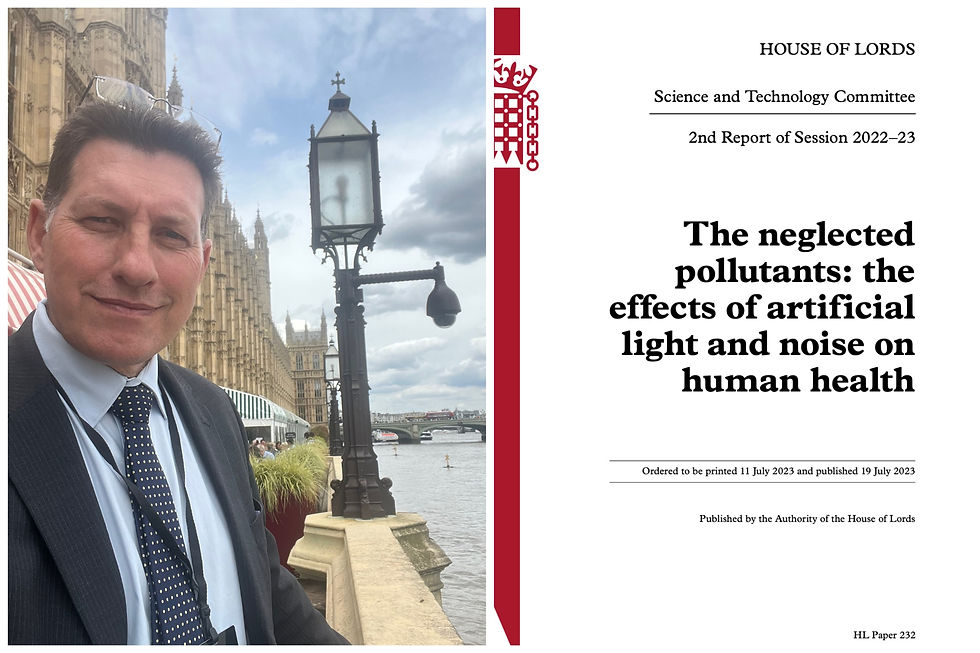Comment on House of Lords ‘The Neglected Pollutants’
- Peter Rogers
- Jul 20, 2023
- 3 min read
Updated: May 8, 2024
Comment on House of Lords ‘The Neglected Pollutants’ - effects of noise on human health.
On the 19th of July, a report on light and noise pollution was published by the House of Lords Science and Technology Committee which has significant implications for how environmental noise pollution is dealt with in the UK.

Both noise and light pollution impact negatively on human health by disrupting sleep and circadian rhythms. Epidemiological evidence suggests that noise pollution causes annoyance and increases the risk of stroke and heart disease. Research from the UK Health Security Agency suggests the equivalent of 130,000 healthy life years are lost from noise pollution each year in Britain. This has significant impacts on the economy: sleep disturbance is estimated to cost the UK economy £34 billion a year, according to RAND Europe, and noise and light pollution are contributing factors.
Sustainable Acoustics welcomes the key findings of the report which has concluded that light and noise pollution are “neglected pollutants”, are poorly understood, and poorly regulated despite their potential to negatively impact human health. We are fully supportive of the report’s conclusions that noise is in need of a renewed focus. This is supported by findings from the UN Frontier Report 2022 Chapter One, Listening to Cities: From Noisy Environments to Positive Soundscapes, that places noise pollution as one of the key areas for focus, alongside wildfires and nature's adaption to climate change.
At Sustainable Acoustics, we have seen how noise can all too often fall through the cracks between departments in Government and that the national policy for noise is not consistently implemented through central government and down to local government implementation on the ground. Noise can often be a serious problem within human settlements, which now contain over half of our human population. These issues can be expensive and complex to resolve retrospectively and these issues have not yet been given the priority to address them proactively in our cities. There is a significant impact on the health and well-being of a large number of people living in the UK from noise pollution and it is a relief to see this recognised. It is now for the Government to respond and make sure these recommendations are implemented.
Sustainable Acoustics welcomes the key policy recommendations of the report which include:
DEFRA should work with UKHSA and other organisations to assess the significant, growing evidence on the harmful health effects of noise.
The Government should set up a noise expert advisory group, as exists for air pollution, to provide independent advice to the Government and a venue for new evidence, particularly on emerging health effects, to be assessed.
The Government should set a specific target to reduce the health burden from noise pollution and identify and implement cost-effective interventions using its new mapping tools. This target should be in place by the time of the next five-year Environmental Improvement Plan cycle.
Peter Rogers, MD of Sustainable Acoustics, who gave evidence to the committee on a range of issues, including the growing evidence on soundscapes and praise for the advancements in Wales says, “As more and more of us live in our towns and cities in greater densities, noise is and will become a bigger problem, burdening our nation’s health systems and degrading our happiness. We welcome this report for highlighting the negative health impacts of noise pollution and for acknowledging that the government needs to do more and for providing key recommendations.
Peter goes on to say, “We hope this triggers the beginning of a transformation that addresses these negative impacts seriously, but also looks at the positive effects sound can have on our wellbeing and builds that into the design of our environments; to design better spaces for people, connecting people with healthier soundscapes that also bring us net bio gains. The aim must be to deliver regenerative design which gives both noise and sound the priority and attention they deserve.

